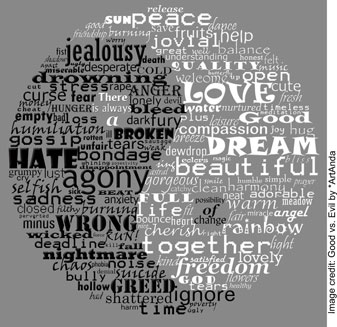FWP:
SETS == OPPOSITES
GOOD/BAD: {22,4}
Many of Ghalib's verses play with opposites, and some play with the particular pair good/bad. This verse however has a special claim to fame: it plays with both well/ill and good/bad, and does its work so deftly that the two pairs of contrasts don't feel forced or heavy-handed. The first line sets up a complex, thought-demanding, seemingly paradoxical claim. In a traditional mushairah performance, we would have had to wait in expectation, trying to figure out where the verse was going and what the poet was going to do with it.
Then the quiet, stark simplicity of the second line comes as-- well, not as a revelation exactly, because there's no real surprise in it. But as a kind of shock of the real. The line feels so direct and apparently naive that it hits us with a strong effect of truth.
Note for cross-language word lovers: Isn't it neat that the Persian-Urdu bad means 'bad'? That's actually the first word in Platts's definition of it. Neither of the two forms is derived from the other, however; it's just an accident of convergent Indo-Persian and English evolution. Another case in point: Persian-Urdu bihtar means 'better'. That too is the first word in Platts's definition. And of course bihtar is actually pronounced with the short 'eh' vowel created by the he (a sound very well established even though not officially recognized), so it sounds even closer.
Compare Mir's even cleverer play on these opposites: M{292,11}.

Nazm:
That is, since the contrary of the wishes always happens, if we had wanted our own ill, then something good would have happened. (199)
== Nazm page 199